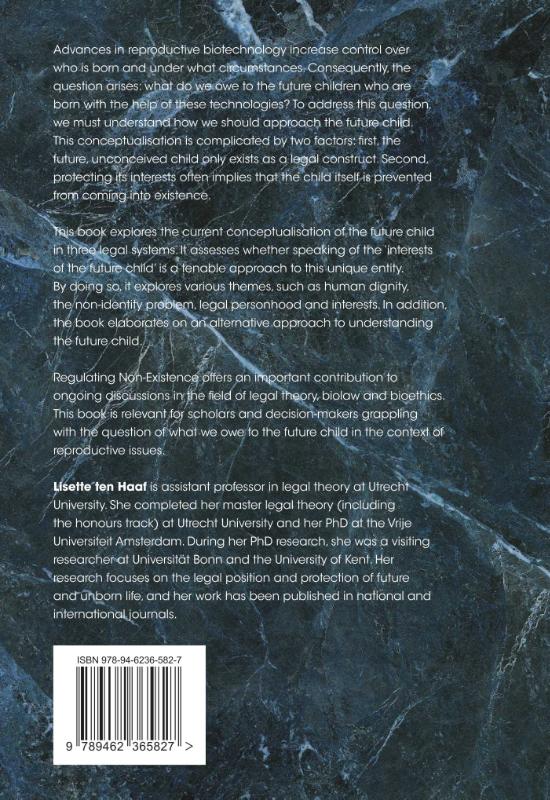- Engels
- Study
- Law
- intern. publiekrecht
- REGULATING NON-EXISTENCE
TEN HAAF, L.
REGULATING NON-EXISTENCE
107,50incl BTW
Vertrouwd sinds 1927
Persoonlijke aandacht en advies
Vanaf 17,50 gratis verzenden NL & BE
Meer dan 150.000 artikelen online
Omschrijving REGULATING NON-EXISTENCE
Advances in reproductive biotechnology increase control over who is born and under what circumstances. Consequently, the question arises: what do we owe to the future children who are born with the help of these technologies? To address this question
, we must understand how we should approach the future child. This conceptualisation is complicated by two factors: first, the future, unconceived child only exists as a legal construct. Second, protecting its interests often implies that the child i
tself is prevented from coming into existence.
This book explores the current conceptualisation of the future child in three legal systems. It assesses whether speaking of the ''interests of the future child'' is a tenable approach to this u
nique entity. By doing so, it explores various themes, such as human dignity, the non-identity problem, legal personhood and interests. In addition, the book elaborates on an alternative approach to understanding the future child.
Regulating
Non-Existence offers an important contribution to ongoing discussions in the field of legal theory, biolaw and bioethics. This book is relevant for scholars and decision-makers grappling with the question of what we owe to the future child in the co
ntext of reproductive issues.
, we must understand how we should approach the future child. This conceptualisation is complicated by two factors: first, the future, unconceived child only exists as a legal construct. Second, protecting its interests often implies that the child i
tself is prevented from coming into existence.
This book explores the current conceptualisation of the future child in three legal systems. It assesses whether speaking of the ''interests of the future child'' is a tenable approach to this u
nique entity. By doing so, it explores various themes, such as human dignity, the non-identity problem, legal personhood and interests. In addition, the book elaborates on an alternative approach to understanding the future child.
Regulating
Non-Existence offers an important contribution to ongoing discussions in the field of legal theory, biolaw and bioethics. This book is relevant for scholars and decision-makers grappling with the question of what we owe to the future child in the co
ntext of reproductive issues.
Specificaties
- MerkEleven international publishing
- GroepRECHT ALGEMEEN (820)
- Barcode9789462365827
- LeverstatusActief
Reviews
0.0/5.0
Gemiddelde uit 0 reviews
Meest behulpzame reviews
Nog geen reviews geschreven




